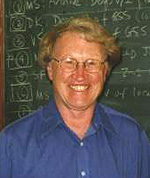Garth Illingworth, professor of astronomy and astrophysics, testified before a congressional subcommittee last week at a hearing on NASA's space science programs. He warned that NASA's highly successful science program is seriously threatened by recent and planned budgetary cutbacks.
Illingworth is chair of the Astronomy and Astrophysics Advisory Committee (AAAC), a congressionally chartered committee established to assess and make recommendations regarding the coordination of the astronomy and astrophysics programs of the National Science Foundation, Department of Energy, and NASA. He testified before the House Committee on Science and Technology's Subcommittee on Space and Aeronautics on May 2.
"NASA science missions have played a central role in the scientific advances in the last two decades," Illingworth said. "Yet this leadership in the scientific and technological arena. . .is clearly at risk in the coming years."
He noted that NASA is significantly underfunded for the mandate that it has been given to implement the Vision for Space Exploration outlined by President George W. Bush.
"The AAAC is deeply concerned about the growing impact on the space and Earth science program and strongly endorses efforts to increase NASA's budget to allow it to undertake the transformation envisaged in the Vision without imparting serious damage to the science program," Illingworth said.
Subcommittee Chairman Mark Udall of Colorado concluded, "If we are going to ask our nation's space science program to undertake challenging and meaningful initiatives, we are going to need to provide the necessary resources."
In addition to Illingworth, witnesses testifying before the subcommittee included Alan Stern, associate administrator for NASA's Science Mission Directorate; Daniel Baker, director of the Laboratory for Atmospheric and Space Physics at the University of Colorado; Lennard Fisk, chair of the National Research Council's Space Studies Board; and Joseph Burns, vice provost for physical sciences and engineering at Cornell University.



